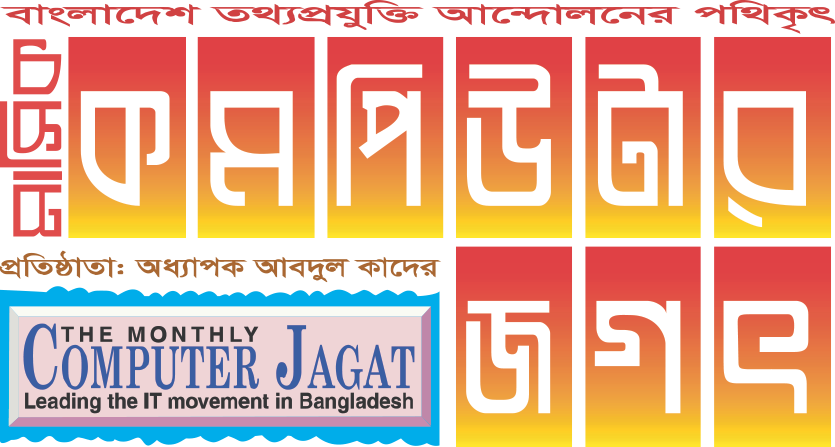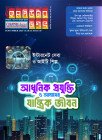হোম > Computer Literacy Program to Materialize the Digital Dream
লেখক পরিচিতি
লেখকের নাম:
ঈদাত অপূর্বা সিংহা
মোট লেখা:৯
লেখা সম্পর্কিত
পাবলিশ:
২০১০ - ফেব্রুয়ারী
তথ্যসূত্র:
কমপিউটার জগৎ
লেখার ধরণ:
ফিচার
তথ্যসূত্র:
ইংরেজি সেকশন
ভাষা:
বাংলা
স্বত্ত্ব:
কমপিউটার জগৎ
Computer Literacy Program to Materialize the Digital Dream
In 1971, the entire nation became united to establish the identity of an independent country named Bangladesh. Eventually, the dream came into reality and Bangladesh was born after nine months of liberation war, which was a rare instance in the history of world. Thereafter we have not observed such a level of courage to accomplish any national vision.
But time has come to reinvigorate our courage and unite ourselves for a new endeavor widely known as ‘Digital Bangladesh’. I would like to define it as digital dream. This term symbolizes a society where technology will enable people to conquer all disparities by improving their livelihood, protecting rights, ensure access to all citizen facilities and create conducive environment for innovative activities.
But prior to these it is essential to gather proper knowledge and expertise to utilize IT as a tool to change fortune. In this regard, IT education has no alternative. The prime minister of Bangladesh has proved her auspicious move by giving precedence to IT in the election manifesto. But as a steadily progressing country, the present financial strength will not allow government to act unilaterally to ensure IT education for all.

As a result, it requires the contribution from the private sector. Realizing this, D.Net (Development Research Network) in association with Volunteers’ Association for Bangladesh-New Jersey (VAB-NJ) kick started a unique initiative called ‘Computer Literacy Program (CLP)’ with the vision to develop an IT educated nation by providing proper training and incentive through ‘Computer Literacy Centers (CLCs)’ to underprivileged community across the country.
It was in 2004, when the idea was conceived to establish CLC in different parts of the country to bring promising rural youths in the mainstream of IT education. Non Resident Bangladeshis are patronizing this initiative by sponsoring CLC in their particular home district. Beside this, Bank Asia Ltd, Hosasin Trust and individual donors also aligned themselves to roll out CLCs in different places of the country.
Currently, 109 CLCs are operational in 39 districts across Bangladesh. Through CLP 257 teachers have already been trained and over 20,000 underprivileged youths and community people have been graduated. Recently, CLP received The Manthan Award South Asia 2009 under the category of e-Education.
“CLP opened a new horizon for knowledge sharing. Our students are now able to gather information regarding science, geography, math etc. from the internet. They are also able to download different tutorial files and other educational contents to strengthen their knowledge. More interestingly, due to CLP students are now feeling more interest in their traditional education”, said a headmaster at Ghagotia Chala High School in Gazipur.
“CLP is a change maker initiative and it also helps us to explore our hidden qualities. After getting computer training I have decided to start my own IT service centre which brings financial freedom in my life,’ said a student at Nagashori D.M Academy in Kurigram.
“At first internet seemed to us a mysterious world. But now it becomes an integral part in our daily life activities. It is possible to find any kind of information from the web. Especially, as a teacher I always search education ministry website and websites of international universities. When I am preparing my study materials internet also helps me to pick up relevant information from different sources. All of these are now a common phenomenon due to CLP”, said a CLC teacher at Brahman Baria High School in Brahman Baria.
Liton is a young entrepreneur who established a CLC in Savar with the financial aid from Bank Asia. This CLC now becomes his prime earning source to maintain life and family as well. Through this CLC he offers computer training to students and persons who need basic IT know how to enrich their profession life. Beside this, he also offers, photocopy, printing, internet and email services from his CLC.
D.Net provides at least 4 PCs to each CLC including a printer, internet modem and other accessories. D.Net also conducts a two weeks training (Windows, MS Office, Paint, web browsing, email, troubleshooting etc.) for two designated instructors from each CLC. Apart from this, D.Net monitors the program implementation process and provides technical assistances.
Some landmark achievements of CLP are given below:
Developed English learning CD “Computer Teachers Everyday English (CTEE)” in a bid to enrich English learning at the CLCs.
Total 51 CLCs are already internet connected.
Some CLCs became self sustained and providing ICT services to the community people.
Students use blog and develop projects on the burning topics in collaboration with Relief International.
A CLC teacher awarded US scholarship for special training on education.
CLP could be a model to spread IT education to the people who still remain uncovered. D.Net envisions of deploying 1000 CLCs by 2010. But it is not only the task of D.Net. It is a national initiative and requires active participation from all segments of the society. Interested organizations or individuals can leverage this initiative or take proper steps to replicate this in different locations of the country based on their availability and capacity.
In order to conduct training D.Net has developed a training manual named as “Esho Computer Shikhi”. This manual covers basics of computer learning with hands on exemplas. Training provided to students by creating batch and each batch comprises 8-10 students and receives 40 structured training. While students receive training free of charge, teachers and best students of each batch are provided financial support (1000 for teachers & 200 for student) for their efforts and internet bill during one year agreement period. Besides this, best students also get the scope to work as a teacher assistant for the particular course.
CJ WEB
Feedback edward.singha@gmail.com
লেখাটি পিডিএফ ফর্মেটে ডাউনলোড করুন
লেখাটির সহায়ক ভিডিও
পাঠকের মন্তব্য
২০১০ - ফেব্রুয়ারী সংখ্যার হাইলাইটস



